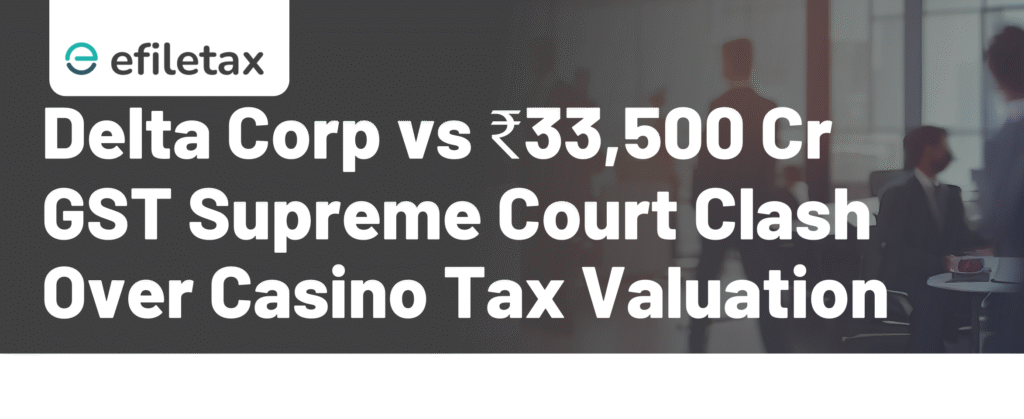
Retrospective GST on Casinos: A Legal and Economic Flashpoint
The focus keyphrase retrospective GST on casinos has become central to one of the most high-stakes tax disputes in India. Delta Corp Limited, the country’s largest casino operator, is fighting a ₹33,500 crore retrospective GST demand that has far-reaching legal and financial implications—not just for the gaming sector but for all taxpayers concerned about certainty and fairness in taxation.
What is the Case About?
- Parties Involved: Delta Corp Ltd and subsidiaries vs Union of India
- Forum: Supreme Court of India
- Issue: Validity of retrospective GST demand from July 1, 2017, to March 31, 2022
- Quantum: Over ₹33,500 crore (including interest and penalties)
- Valuation Basis Dispute:
- Govt: Tax on Gross Bet Value (GBV)
- Delta: Tax should be on Gross Gaming Revenue (GGR)
Key GST Legal Provisions in Dispute
| Provision | Government’s Argument | Delta Corp’s Counter |
|---|---|---|
| Rule 31A(3) of CGST Rules | GST on full bet value in gambling | Applicable only to race clubs, not casinos |
| Rule 31C (Oct 2023) | New rule for casino valuation | Prior SCNs based on Rule 31A are void |
| Article 246A (Constitution) | Enables Centre to tax GST | Gambling regulation lies with states |
| Article 14 & 19(1)(g) | — | Retrospective demand violates equality and freedom of trade |
GGR vs GBV – Why This Matters
Delta argues that GST should be levied only on actual earnings (GGR), not on the total bet amounts (GBV).
Example from SC submissions:
- Actual revenue (GGR): ₹10,000
- GST demanded on GBV: ₹61,600
- Effective tax rate: 616%
“The GST calculated on GBV is over 6 times the consideration received,” said Dr. Singhvi, Senior Advocate, calling it confiscatory and unconstitutional.
Financial Breakdown: GST Paid vs GST Demanded
| Entity | GGR (₹ Cr) | GST Paid (₹ Cr) | GST Demanded (₹ Cr) | Demand/Revenue Ratio |
|---|---|---|---|---|
| Delta Corp (Goa) | 1,640.40 | 358.39 | 11,139.61 | 6.79x |
| Delta (Sikkim) | 77.30 | 18.14 | 628.20 | 8.12x |
| Delta Pleasure Cruise | 220.25 | 53.97 | 1,765.22 | 8.01x |
| Highstreet Cruises | 542.99 | 112.09 | 3,289.94 | 6.06x |
| Total | 2,480.94 | 542.59 | 16,822.97 | 6.78x |
With interest and penalty, the final demand crosses ₹33,500 crore.
Constitutional Questions Raised
Delta Corp has invoked the following key constitutional arguments:
- Legislative Competence:
GST laws cannot override state powers on gambling under Entry 62 (List II). - Fair Taxation Principle (Article 14):
Taxing more than the actual income is arbitrary and discriminatory. - Freedom of Trade (Article 19(1)(g)):
Such tax demands destroy licensed businesses and deter legitimate activity. - Retrospective Application of Law:
Applying it back to 2017 is legally unsound.
Real Money Gaming Sector Also Impacted
Senior Advocate Balbir Singh argued for online gaming platforms, noting:
- Online real money games were taxed as OIDAR services pre-2023.
- Retrospective GST demands on that basis are “untenable.”
Expert Tip: Why This Case Sets Precedent
If the retrospective GST on casinos is upheld, it could trigger:
- Similar retrospective demands across sectors
- Uncertainty in how rules are interpreted years later
- Shrinking investor confidence in regulated industries
Expert Insight: Always retain detailed tax filings, legal opinions, and valuation workings. When the law is vague or evolving, documentation becomes your shield.
What’s Next in the Supreme Court?
- Final hearing set for July 25, 2025
- Bench: Justices J.B. Pardiwala and R. Mahadevan
- Verdict to shape the future of gaming, taxation, and federalism in India
Summary
Retrospective GST on casinos is being challenged in Supreme Court as Delta Corp faces ₹33,500 crore demand. The dispute centers around gross bet value vs actual revenue, raising key questions on tax fairness, legal validity, and constitutional limits.
FAQs
Q1. Why is GST being demanded on casinos retrospectively?
Because the government is applying Rule 31A to casino operations for FY 2017–22, even though a specific rule (31C) was introduced only in 2023.
Q2. What is the core issue—GGR or GBV?
Delta says only GGR (actual earnings) should be taxed, while the Centre insists on GBV (total bet amount), causing inflated tax liability.
Q3. Is gambling under Centre’s or State’s power?
Traditionally, gambling falls under the State List. Delta argues that post-GST, Centre needs a new law or explicit provision to tax such services.
Q4. What happens if SC rules against Delta?
It may open floodgates for retrospective demands on other gaming and entertainment sectors, creating significant compliance and business risks.
Final Word
The Supreme Court’s verdict on retrospective GST on casinos will have implications beyond gaming. It touches on constitutional balance, taxpayer rights, and the predictability of India’s tax regime. Whether you’re a casino operator or a small business owner, this case underlines the need for clarity and legal safeguards in taxation.